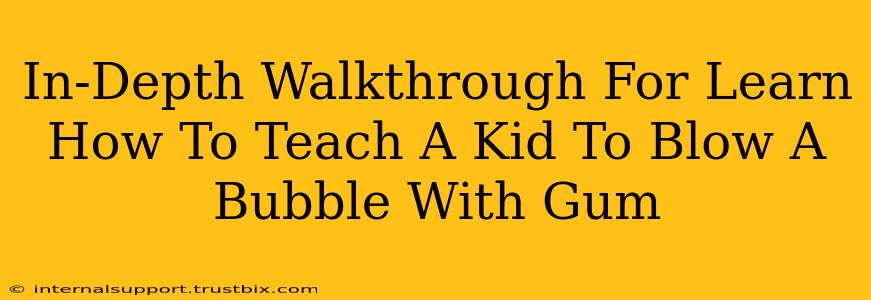Teaching a child to blow a bubble with gum is more than just a fun activity; it's a developmental milestone that requires coordination, breath control, and patience. This in-depth guide provides a step-by-step approach to help you successfully teach your little one this satisfying skill.
Preparing for Bubble-Blowing Success
Before you even open the gum wrapper, preparation is key. This stage lays the groundwork for a positive and successful learning experience.
1. Choosing the Right Gum:
- Size and Flavor: Opt for small, individually wrapped pieces of bubble gum. Familiar, appealing flavors can increase a child's enthusiasm. Avoid extra-large pieces which can be overwhelming for small mouths.
- Bubble-blowing Properties: Look for gum explicitly labeled as "bubble gum." The ingredients are designed for optimal bubble formation.
2. Setting the Stage:
- Location: Choose a clean, safe space, free from distractions. A table or surface helps prevent gum from getting lost.
- Clean Up: Have napkins or tissues readily available to manage sticky situations (and there will likely be some!).
- Patience is Key: This isn't a race. Expect multiple attempts, potential frustration, and celebrate small victories along the way.
Step-by-Step Bubble-Blowing Tutorial
This section outlines the precise steps involved in teaching a child to blow a bubble, catering to their developmental stage.
1. Chewing the Gum:
- Gentle Chewing: Guide the child to chew the gum gently and thoroughly. Excessive chewing can make the gum too soft and difficult to form a bubble.
- Forming a Soft Ball: Encourage them to work the gum into a soft, round ball. This step requires patience and practice.
2. Positioning the Gum:
- Tongue Placement: Instruct the child to place the gum in the center of their tongue. This is crucial for bubble formation.
- Lip Formation: Have them gently purse their lips around the gum, forming a tight seal. This prevents the gum from escaping.
3. The Art of Blowing:
- Gentle Exhalation: Explain that they need to blow gently and steadily, not forcefully. A soft, controlled exhale creates the best bubbles.
- Tongue Positioning: Explain how keeping their tongue flat against the bottom of their mouth is key; the gum needs the tongue's support.
- Practice Makes Perfect: Expect many attempts. Encourage persistence, and praise every small improvement.
4. Troubleshooting Common Issues:
- Gum is too Hard: If the gum is too firm, have them chew it more.
- Gum is too Soft: The bubble may break easily. Start again with a new piece.
- Child is Blowing Too Hard: Encourage gentle, controlled exhalation.
Beyond the First Bubble: Advanced Techniques & Fun Activities
Once your child has mastered the basics, consider the following:
- Bubble Size Competitions: Turn bubble blowing into a fun competition, encouraging friendly rivalry.
- Bubble Solutions: Introduce homemade or store-bought bubble solutions for larger, longer-lasting bubbles. This can add a new layer of engagement.
- Creative Bubble Shapes: Explore creating different bubble shapes using various techniques.
Mastering the art of blowing bubbles is a rewarding experience for both the child and the teacher. Remember, patience and encouragement are paramount. By following these steps and fostering a fun, supportive environment, you can help your child achieve this delightful skill and enjoy countless hours of bubbly fun!

